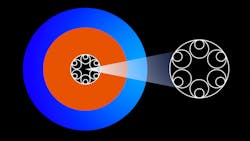Comcast says it has deployed a 40-km route with hollowcore fiber (in a hybrid cable alongside conventional fiber) from Lumenisity in Philadelphia and has begun evaluating its performance. The U.S. Tier 1 cable MSO says it has already demonstrated the fiber’s ability to support coherent transmission, data rates from 10G to 400G, and single-fiber bidirectional operation.
The 40 km is the longest publicized deployment by an ISP; BT deployed a 10-km testbed (see “BT testing hollowcore fiber for 5G support”), while a 7-km link with euNetworks is Lumenisity’s longest announced commercial deployment (see “euNetworks deploys more hollowcore fiber cable”). Hollowcore fiber’s utility traditionally has been hampered by reach limitations from poor attenuation performance. However, Lumenisity believes its nested anti-resonant nodeless fiber (NANF; see "Startup Lumenisity unveils hollowcore fiber cables for DWDM applications, new funding") provides a pathway toward a solution to such problems. In fact, the company has announced a second generation of its fiber, called DNANF (with “D” for “double”), that the company asserts will offer lower loss in the O-Band and comparable or better loss in the C-Band than standard single-mode fiber. Lumenisity expects to offer such fiber within its CoreSmart cables toward the end of this year.
Comcast’s link uses the existing generation of NANF, and the route’s 40 km is enough to get the attention of Elad Nafshi, executive vice president and chief network officer at Comcast Cable. “Forty kilometers, that’s starting to be real,” he told Lightwave. While he declined to speculate about potential future deployments, Nafshi noted that hollowcore fiber links could benefit customers seeking the lowest latency possible or where latency concerns previously have limited the distance between network elements. Sources at BT had mentioned similar attributes in describing the rationale for their investigations of hollowcore fiber.
For related articles, visit the Optical Technologies Topic Center.
For more information on fiber and suppliers, visit the Lightwave Buyer’s Guide.
To stay abreast of optical communications technology, subscribe to Lightwave’s Enabling Technologies Newsletter.
About the Author

Stephen Hardy
Editorial Director and Associate Publisher, Lightwave
Stephen Hardy is editorial director and associate publisher of Lightwave and Broadband Technology Report, part of the Lighting & Technology Group at Endeavor Business Media. Stephen is responsible for establishing and executing editorial strategy across the both brands’ websites, email newsletters, events, and other information products. He has covered the fiber-optics space for more than 20 years, and communications and technology for more than 35 years. During his tenure, Lightwave has received awards from Folio: and the American Society of Business Press Editors (ASBPE) for editorial excellence. Prior to joining Lightwave in 1997, Stephen worked for Telecommunications magazine and the Journal of Electronic Defense.
Stephen has moderated panels at numerous events, including the Optica Executive Forum, ECOC, and SCTE Cable-Tec Expo. He also is program director for the Lightwave Innovation Reviews and the Diamond Technology Reviews.
He has written numerous articles in all aspects of optical communications and fiber-optic networks, including fiber to the home (FTTH), PON, optical components, DWDM, fiber cables, packet optical transport, optical transceivers, lasers, fiber optic testing, and more.
You can connect with Stephen on LinkedIn as well as Twitter.
